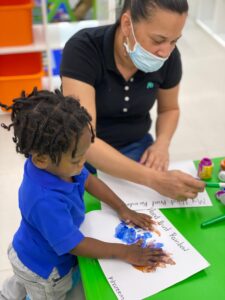Want to explore more?
Learn how we help your child develop into a thoughtful, caring,
and adaptable individuals using our learning approach that
exceeds state standards
YOUR CHILDREN DESERVES THE BEST
Preparing your infant and children for life development milestones
Because every child is capable, valuable and deserving of reaching his or her full potential, it is our mission to provide tools and resources that empower both parents and children to experience learning through creative expression, play and open-ended discovery
Social-emotional development refers to a child’s ability to identify feelings, self-regulate and build relationships.
High-quality relationships correlate to positive outcomes for young children (Shonkoff, 2004). Brain research verifies that emotional and cognitive development are interrelated (Bell & Wolf, 2004). Young children who have strong social and emotional development are more likely to have good academic performance in future schooling (Cohen, 2005). Therefore, Mother Goose Time integrates a social-emotional component into each lesson plan.

1. Self-Concept
2. Self-Direction
3. Social Relationships

Language and literacy skills refer to a child’s ability to communicate and connect with others through listening, speaking, reading and writing.
Learning language is a social experience and requires symbolic processing. The relationship between thought and word is “not a thing, but a process, a continual movement back and forth from thought to word and from word to thought” (Vygotsky, 1962, p. 125). Mother Goose Time is a literacy-rich curriculum and invites children to ask questions and explore ideas through discussion and dramatic play. Moreover, we encourage children to construct autobiographical narratives in the form of storytelling, journaling and drawing. Language skills are some of the best predictors of academic success (Snowling, Hulme, Bailey, Strothard & Lindsay, 2011).
7 .Listening Comprehension
8. Communication
9. Vocabulary
10. Phonological Awareness
11. Concepts of Print
12. Letter/Word Recognition
13. Reading Comprehension
14. Emergent Writing
Mathematics and reasoning skills include a child’s ability to count, understand number sense, manipulate objects, create patterns, sort, compare and measure.
Research on children’s learning in the first six years of life validates the importance of early experiences in mathematics for lasting positive outcomes (Bowman, Donovan & Burns, 2001). Through Mother Goose Time curriculum, children develop the ability to reason mathematically and become increasingly sophisticated in the ability to recognize and analyze the mathematics inherent in the world around them (Baroody, Bajwa & Eiland, 2009). Children’s early mathematical experiences play a significant role in the development of their understanding of mathematics and serve as a foundation for their cognitive development (Tudge & Doucet, 2004).

Physical development refers to a child’s gross and fine motor skills. To increase strength, muscle control, and coordination, the child requires adequate nutrition and fitness levels.
Physical development in children follows a directional pattern (Bayley, 1993). Large muscles develop before small muscles. Mother Goose Time curriculum actively engages a child’s mind and body through multidisciplinary activities that invite children to touch, climb, crawl, and manipulate objects in their surrounding environment.
Infants (3-12 Months)
Learning Core Skills Through Fun Monthly Themes
During the infant stage physically being present is vital. This stage is where children learn to trust the outside bounds of immediate family. Regular playtime including belly and music time, exploration, stimulation, as well as nap and feeding times that we keep consistent with your baby’s individual schedule. We ensure that all infants receive nurturing care in order to blossom into a secure and confident individual
Contact us today for more information about our infant programs!
Enjoy Infant Reports
Give Your Infant the Care They Need:
- Naps
- Eating
- Drinking
- Playing
- Diaper and Potty Training
Toddlers (1-2 Years)
Give Your Toddler the Care They Need
As your child reach their mobile stage, their natural inquisitiveness will be encouraged with daily activities that include music, fitness, dramatic play, art, blocks, and books. Our teachers use these observations to recognize your child’s learning style and create projections based on your child’s development. At this stage many toddlers possess a vocabulary of at least 50 words and yearn to communicate. Daily lessons focus on language development, communication, fine/gross motor skills and pre-math skills.
Count on us to give your toddler the enriching and protective care they deserve. Contact us today for more information.
